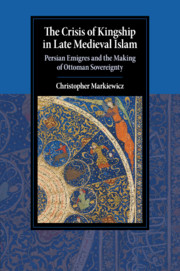'This belongs among the best treatments that combine intellectual and sociopolitical history based on Islamic materials. Markiewicz’s dense presentation of the life and work of Idris Bidlisi shows both how ideas matter for the conduct of politics and why they must be understood as responses to specific historical situations. The book is essential reading for scholars concerned with the Ottoman, Aqquyunlu, and Safavid empires as well as with Persian as a medium for historiography and the chancery.'
Shahzad Bashir - Aga Khan Professor of Islamic Humanities, Brown University, Rhode Island
'A masterly study, deeply researched, many-layered and carefully nuanced. Markiewicz offers keen insights into a little known scholarly and philosophical world, and widens the scope of debate about the Ottoman self-image in the crucial era after 1517. Approaching the topic through the thought and influence of Idris Bidlisi makes a potentially impenetrable mass of esoteric thought clearly accessible to modern researchers.'
Christine Woodhead - Honorary Fellow of Ottoman History, University of Durham
‘This is an old-school monograph in the of best ways; it is extremely focused and necessary reading for experts in the field.’
R. A. Miller
Source: Choice
‘… an admirable biography of a major scholar and scribe as well as a rich study of intellectual activity in the 15th–century and 16th–century … makes important contributions to Islamic political thought, as well as to the nexus between patronage, literary culture, and intellectual output, especially in historical writing. It is also an excellent biography.’
Ethan L. Menchinger
Source: International Journal of Middle East Studies
‘Markiewicz’s reworking of his PhD thesis has produced a book that is complex in its ideas and argument, beautifully structured, written in clear and well-signposted prose, and cleanly produced in the Cambridge Studies in Islamic Civilization series.’
Amy Singer
Source: Speculum



